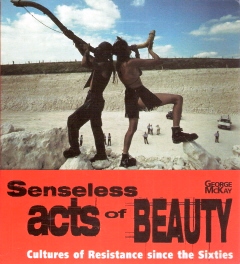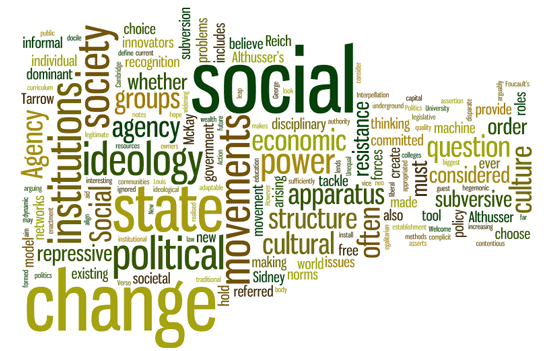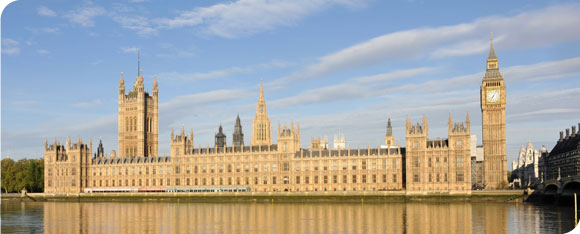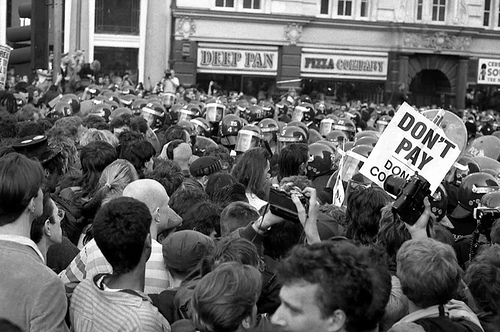Welcome to our first post by guest Mark Hepburn. Agency and structure are the two biggest issues when it comes to social change, can agency have an impact on structure or does structure define our agency, read more to find out.
The state provides us with institutions which govern policy making and hold legislative powers enabling the government to preserve the status quo. Unequal exchanges of labour for capital are preserved through legislation in order to keep the owners of property and wealth in power. This superstructure of the state, made up of institutions, is often referred to as the “repressive state apparatus” by free thinkers arguing for a more egalitarian society, the structure acts knowingly and often unknowingly (to the public) wielding it’s power over society as a means of control, the media is also complicit in creating this false consciousness that makes us believe we must accept things as they are and not question authority, we only have to look at our current model of representative politics to realise we have a government we did not elect, a top down political model that dictates and inflicts it’s ideology on society.
However we do have a very important tool at our disposal, “Agency” which is diametrically opposed to the superstructure’s repressive state apparatus. Agency allows us the ability to choose lifestyles, ideologies, identities’, association as we choose. These pockets of cultural resistance born of free choice are needed in order to renegotiate the spaces we live in and question societal “norms”, a Heterotopia as Foucault described it. There are arguments, for instance that the power of the state enforces roles on the individual, thus forcing ideology on the individual. Althusser refers to this process as use of “repressive state apparatus”, these roles enforced by dominant ideological politically controlled institutions, such as the law, education and military become internalised by the actor through what is referred to as “Interpellation” i.e. being made a subject of an ideology through arguably coercion whether realised or subliminal. Althusser’s theory can be likened to Foucault’s study of disciplinary institutions which through the enactment of disciplinary power over the body create “docile bodies” ie complacent citizens. It is interesting to note that Althusser’s work is not on the curriculum in schools or colleges as it may not confirm to “state approved” thinking.
Critical thinking leads to an individual’s recognition of their own agency, and to align with others forming communities and networks. These networks or Cultures of resistance (McKay 1998) seek social change through the proposal, experiment and establishment of alternative methods of existence. These cultures of resistance are grouped under the moniker of “Social movement” the term social movement constitutes any group committed to social, political, economic or cultural change, whether considered legitimate or illegitimate, formal or informal and includes those considered subversive by the Hegemonic ideology. This includes those groups that consider themselves Anarchists, Marxists and the DIYer’s who all, by their very nature are committed to social change. Traditionally social movements are formed from the fringes of society shaped by ever widening political, social, economic and cultural forces.
Social movements continue to question societal imposed “norms” and aim to transcend class, gender antagonisms and even the nation state. Social movements are dynamic organisations centred on shared values often addressing contentious political issues of the moment capturing the zeitgeist. This lends social movements an ever evolving quality that is far more adaptable than existing social institutions. Sidney Tarrow (1998) notes that informal social movements hold power as real as existing political and economic institutions.( A monumental assertion that should not be ignored by those in small disparate groups attempting to initiate social change).
 Mckay asserts underground countercultural groups are inducing change at the community level, these groups have the skills to tackle problems arising and providing solutions (often through direct action) to poor institutional decision and policy making. These explorers and innovators of alternatives, so called dissidents and anarchists, are constantly discredited by the traditional hegemonic state apparatus as being subversive rather than genuine agents of change. Arguments that change attitudes toward a more sustainable future are considered subversive and this myth of subversion perpetuated by those of a neo liberal ideology (currently the dominant ideology), progressives understand subversion to be a tool for change. These “subversives/progressives” are in fact “innovators” and provide the world with fantastic new ideas with which to tackle problems faced by society and the increasing scarcity of resources.
Mckay asserts underground countercultural groups are inducing change at the community level, these groups have the skills to tackle problems arising and providing solutions (often through direct action) to poor institutional decision and policy making. These explorers and innovators of alternatives, so called dissidents and anarchists, are constantly discredited by the traditional hegemonic state apparatus as being subversive rather than genuine agents of change. Arguments that change attitudes toward a more sustainable future are considered subversive and this myth of subversion perpetuated by those of a neo liberal ideology (currently the dominant ideology), progressives understand subversion to be a tool for change. These “subversives/progressives” are in fact “innovators” and provide the world with fantastic new ideas with which to tackle problems faced by society and the increasing scarcity of resources.
The question arising here is whether change appropriated by social movements can influence the majority culture sufficiently to provide a leap towards a more decentralised, participatory, democratic world based on mutual aid. I believe only through the recognition of our own inherent “Agency” can we hope to invoke change and create a society that is mutually beneficial to all. We must also actively install a sense of agency through engaging those around us in order to build a new culture from the bottom up.
“…The revolution must be cultural. For culture controls the economic and political machine, not vice versa. The machinery turns out what it pleases and forces people to buy, but if the culture changes, the machine has no choice but too comply…” (Reich 1978:329)
Ferreter, Luke (2002) Louis Althusser, Routledge Oxford
McKay, George (1998) DiY Culture: Party and Protest in Nineties’ Britain, Verso
Reich, Charles (1978) The Greening of America Bantam New York
Tarrow, Sidney (1998) Power in Movement: Collective Action, Social Movements and Politics, Cambridge University Press



